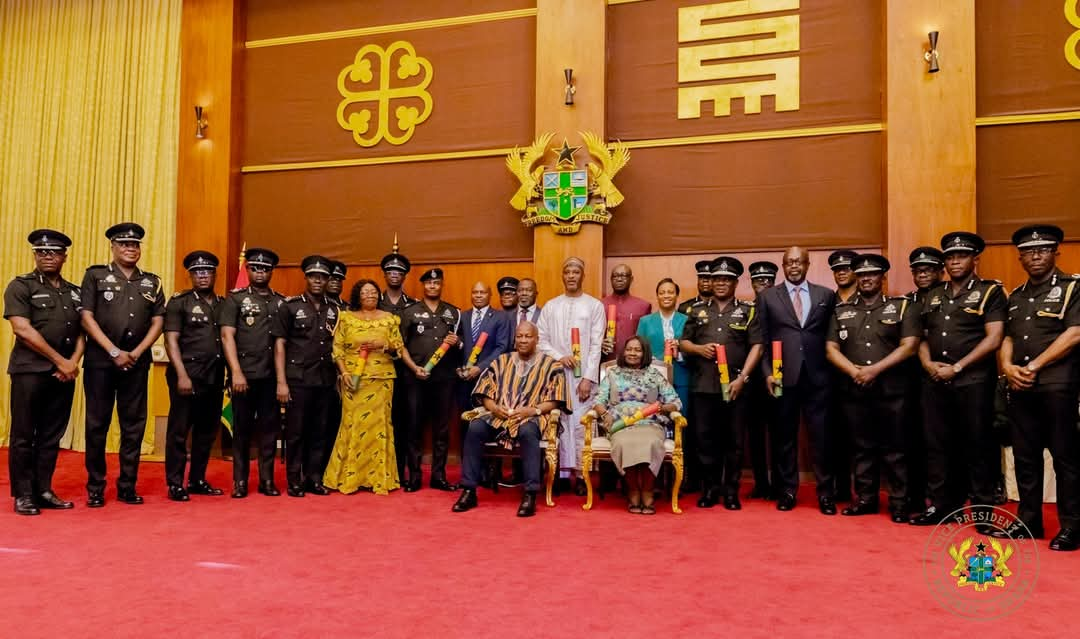President John Dramani Mahama has sworn in a new Police Council with a bold charge to confront and reset the Ghana Police Service, calling for a transformation rooted in integrity, fairness, and community trust.
At a solemn event marked by national symbolism and institutional gravity, the President said the council’s formation represents more than a constitutional formality; it signifies a renewed national covenant to fortify the rule of law and re-establish justice at the heart of public service.
“We gather here not just to administer oaths but to inspire hope in our institutions, the future of our police service, and above all, hope in the enduring power of justice to unite and elevate our nation”
President John Dramani Mahama
Addressing Vice President Jane Naana Opoku-Agyemang, ministers of state, the Inspector General of Police, members of the newly constituted council, and other dignitaries, President Mahama placed the council’s work in the broader context of Ghana’s democratic resilience and institutional rebuilding.
The President congratulated the new members and particularly acknowledged Vice President Opoku-Agyemang’s appointment as chair of the council, describing it as a testament to her “integrity, expertise, and proven dedication to serving your nation.”

In his speech, the President did not shy away from directly confronting the challenges facing the police service. He lamented what he described as a long-standing erosion of credibility, citing politicization, arbitrary promotions, unfair postings, and professional breaches that have plagued the service.
“Many of your officers feel sidelined and demoralized, and many citizens feel unheard and unprotected. These conditions are not sustainable in a just and democratic society”
President John Dramani Mahama
He called on the council to be bold and impartial in addressing grievances both within the ranks and among the public. He emphasized that professionalism, not political interference, must guide the council’s work, asserting that a “people-centered vision of policing” should be paramount.
“Security is not simply the presence of armed personnel on our streets. Proper security exists when citizens feel safe in their homes, on their streets, and in the hands of the institutions established to protect them”
President John Dramani Mahama

Mahama tasked the council with promoting community policing, strengthening accountability, and aligning the police service with his administration’s broader reset agenda – centered on digital transformation, institutional renewal, and professionalism across all sectors.
The President devoted considerable focus to officer welfare, arguing that demoralized officers working under substandard conditions cannot offer the professionalism and dedication the public deserves.
“Our officers cannot give their best when they are demotivated, when they are underpaid, when they are poorly dressed, poorly housed, or working in substandard conditions,” the President admitted and called for logistical support, better accommodation, improved pensions, and psychological care.
Promotions, he stressed, must be grounded in merit and fairness, not favoritism. He also pledged government support for a “massive retooling” of the service and acknowledged recent police achievements in fighting armed robbery, solving high-profile murder cases, and collaborating with Nigerian authorities on cross-border kidnappings.
Nonetheless, the President reminded the police that many murders remain unsolved and conflict-area assassinations demand urgent and thorough investigations. He also announced a nationwide effort to install street lights in major urban areas to bolster nighttime security.

Vice President Commits to Ethical Leadership
Vice President Jane Naana Opoku-Agyemang, now Chairperson of the Police Council, echoed Mahama’s call for reform, promising principled leadership and accountability.
“I accept this role not as a privilege, but as a solemn duty to the people of our nation and to the men and women of integrity who serve in our police service”
Vice President Jane Naana Opoku-Agyemang
She emphasized the non-ceremonial nature of the council’s role, describing it as a “moral and strategic compass” and vowed to lead with “transparency, inclusivity and a deep respect for the rule of law.”
The Vice President promised firm but fair discipline within the service and committed to eliminating delays in promotions and unjust treatment of officers.
She highlighted the need to reset leadership within the police, reinforce community trust, and entrench a culture of human rights and accountability. “We must promote a culture where the uniform is a symbol of honor, not fear.”
She assured officers of the council’s support and the administration’s commitment to fair treatment and systemic transformation. Addressing citizens directly, she reaffirmed the council’s central focus: public safety, rights, and confidence.

The reconstituted Police Council includes Chairperson Jane Naana Opoku-Agyemang, Interior Minister Muntaka Mohammed Mubarak, Inspector General of Police Christian Tetteh Yohuno, and Attorney General’s Representative Dr. Dominic Akuritinga Ayine.
It also includes other representatives from the Ghana Bar Association, the Retired Senior Police Officers Association, and presidential appointees including COP (Rtd) Rose Bio Atinga and Benson Tongo Baba.
The President ended his remarks by calling for national unity in supporting the council’s work and reaffirming his own commitment to backing the council in all efforts rooted in justice and institutional renewal.
“This swearing in is more than just an administrative event. It’s the beginning of a new covenant, a solemn promise to make Ghana safer, fairer, and more just”
President John Dramani Mahama
As Ghana charts its path through economic recovery and security modernization, the formation of the new Police Council stands as a pivotal moment. Both President Mahama and Vice President Opoku-Agyemang have thrown the full weight of the executive behind a comprehensive reform agenda.
Whether this marks the beginning of a new era for law enforcement in Ghana now rests on the council’s ability to fulfill the sacred trust they have been handed.
READ MORE: ASEC Blasts Fuel Levy Postponement, Calls for Full Repeal


















